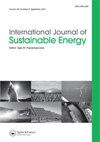发展中国家的可再生能源消费和碳排放:资本市场的作用
IF 2.7
Q4 ENERGY & FUELS
引用次数: 0
摘要
本研究考察了资本市场对能源消费与碳排放关系的影响。通过对138个发展中国家1990-2020年的样本采用系统广义矩量方法(GMM),我们发现可再生能源消费与碳排放之间呈u型反向关系。研究表明,超过71.03的阈值,可再生能源消费倾向于增加碳排放。同样,碳排放的初始水平减少了可再生能源的使用,但超过2.5的碳排放水平,可再生能源的消费开始增加。研究发现,股票市场和债券市场均能降低碳排放,提高可再生能源消费水平。资本市场增强了可再生能源消费对碳排放的负向影响,而公司债券市场放大了碳排放对可再生能源消费的负向影响。本文章由计算机程序翻译,如有差异,请以英文原文为准。
Renewable energy consumption and carbon emissions in developing countries: the role of capital markets
This study examines the impact of capital market on the relationship between energy consumption and carbon emissions. By employing a system Generalised Methods of Moments (GMM) for a sample of 138 developing countries over the period, 1990–2020, we find a U-shaped reverse relationship between renewable energy consumption and carbon emissions. The study reveals that beyond a threshold of 71.03, renewable energy consumption tends to increase carbon emissions. Similarly, the initial levels of carbon emissions reduce the use of renewable energy but beyond a 2.5 level of carbon emissions, renewable energy consumption begins to increase. We find that both the stock market and bond market reduce carbon emissions and enhance the levels of renewable energy consumption. We provide evidence to support that the capital market enhances the negative impact of renewable energy consumption on carbon emissions, while the corporate bond market magnifies the reductive effect of carbon emissions on renewable energy consumption.
求助全文
通过发布文献求助,成功后即可免费获取论文全文。
去求助
来源期刊

International Journal of Sustainable Energy
ENERGY & FUELS-
CiteScore
5.70
自引率
3.20%
发文量
52
期刊介绍:
Engineering and sustainable development are intrinsically linked. All capital plant and every consumable product depends on an engineering input through design, manufacture and operation, if not for the product itself then for the equipment required to process and transport the raw materials and the final product. Many aspects of sustainable development depend directly on appropriate and timely actions by engineers. Engineering is an extended process of analysis, synthesis, evaluation and execution and, therefore, it is argued that engineers must be involved from the outset of any proposal to develop sustainable solutions. Engineering embraces many disciplines and truly sustainable solutions are usually inter-disciplinary in nature.
 求助内容:
求助内容: 应助结果提醒方式:
应助结果提醒方式:


